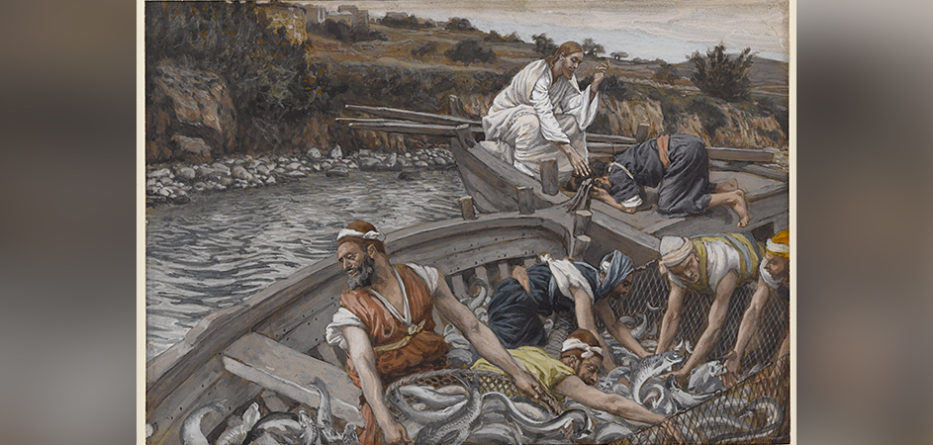While celebrating World Mission Sunday in 2019, Pope Francis asked, “What instructions does the Lord give us for going forth to others?” and answered, “Only one, and it’s very simple: Make disciples.”
The word ‘disciple’ is often heard in current ‘Church’ conversations. It has even been suggested that a lack of discipleship is at the forefront of the decline in practice we are experiencing in the Church today. If this is indeed the case, then Pope Francis’ simple answer leads us to further questions: What is a disciple? How do we make one? And more importantly, am I a disciple?
I think we can find some answers through one of the very first disciples, St Peter. In Luke chapter 5, Peter the fisherman is washing his nets after what has been an unsuccessful night of fishing. On the shoreline not far away, Jesus is teaching, and beginning to get crowded by the many people wanting to get closer to hear him. He has an idea. Getting into Peter’s boat, he asks Peter to pull out a bit from the shore… It is clear that Peter understands that Jesus is someone with some authority, because when Jesus asks him to put the nets out for a catch, Peter agrees, despite not expecting to catch anything.
The result of this fishing attempt overwhelmed Peter. So many fish were caught that the nets started breaking and the boat was sinking. Peter now knew deep inside that Jesus was from God. This was no longer just an intellectual understanding based on what he had heard Jesus teach, but rather an experience based on his relationship with Jesus. Peter’s first response was to recognise his own unworthiness. Yet Jesus reassured him and confirmed the call, which Peter answered by leaving everything and following him. Peter had no idea how the future would play out, what would ultimately be asked of him, and the challenges that he would face. He simply said ‘yes’ and chose to follow Jesus.
Sherry Weddell refers to this text when speaking about intentional disciples as people who ‘drop their nets’ and follow Jesus. The encounter with Jesus changed everything for Peter and his fellow fishermen. Peter spent the next three years in Jesus’ inner circle, walking alongside him, eating with him, learning from him, observing how he lived and acted, and experiencing miracles along the way. We also know, only too well, of his failures; not always being able to understand Jesus, being corrected quite strongly at times (“Get behind me, Satan!” – Mt 16:23) and denying that he even knew Jesus. Yet he ended up giving his life for his Master and the Kingdom. He gave everything, as did Paul and the other disciples of the early Church, as well as countless others in the Church’s long history.
So what can we learn from Peter about discipleship? First, it starts by being captivated by Jesus. This may be a pivotal experience, or perhaps an understanding fostered over many years. Our journey may have begun at our baptism; we may have heard the story of Jesus through the witness of a family member or a friend; or we may have come to know Jesus through a series like Alpha, a retreat, during prayer or the Mass. In some way, however, we encounter Jesus and he speaks to our heart.
This experience calls for a response. Like Peter, being a disciple of Jesus means being someone who actively learns from him and follows him. We must each make this choice for ourselves and say ‘yes’ to accepting Jesus as our Lord and God. After all, it is Jesus who gives us the ultimate fullness of life through the Holy Spirit.
Like Peter, we also need to be apprenticed. Discipleship is a journey, and it takes time. We need to be accompanied along the way, not simply left to manage on our own. To be able to follow, we need to know more about Jesus, to build a relationship with Him through prayer, to really listen to Him, to read the scriptures, to meet Him in the Sacraments, and to learn from and with the community of the Church, the Body of Christ. Disciples continually learn and grow, both alone, and in a particular way, together. When we inevitably come across struggles, doubts and challenges as Peter did, having a faith community to support us is essential.
To better recognise what discipleship might look like in practice, it can be helpful to offer a description. Fr James Mallon describes a disciple as someone who:
- has a personal relationship with Jesus
- can and does share faith with others
- is open to the gifts of the Holy Spirit
- has knowledge and love of the Scriptures
- knows basic Catholic theology
- has a daily prayer life
- experiences real Christian community
- has a commitment to Sunday Eucharist
- celebrates the Sacrament of Reconciliation
- can pray spontaneously out loud when asked
- serves in ministry
- sees his or her life as a mission field[1]
While other attributes may be added, this list offers us a good starting point to better understand the areas of growth for us to become mature disciples.
If we take up Pope Francis’ statement to ‘make disciples’, the above can help us to see what this means. It means to create relevant and welcoming spaces where people can encounter Jesus and then develop a personal relationship with Him; where they experience real and authentic community; where people can read the Scriptures and learn about faith; where people have opportunities to pray and to welcome the Holy Spirit; where people can be encouraged to use their gifts in service to others; and where everyone shares their faith with others, inviting them into the joy of the Good News that they themselves experience. Just as Jesus’ priority was to go out to invite everyone into God’s love, so should it be for his followers.
As more and more people become authentic disciples, a new energy and passion will be felt in our parishes. Pope Francis’ simple statement proves to be the key. Disciples are ‘made’ when people come to know Jesus and decide to follow him. It is therefore important to put in place discipleship pathways where people can enter the journey of knowing Jesus and keep taking further steps along the way to support their growth.
It starts with each of us.
In reflecting on the above list of attributes, what might be the next step that you will take?
Pina Bernard is the Team Leader Parish Renewal and Discipleship team, Diocese of Broken Bay.
Reproduced with permission from the December 2020 edition of Broken Bay News, the news publication of the Diocese of Broken Bay.
[1] Divine Renovation Guidebook, p.159








